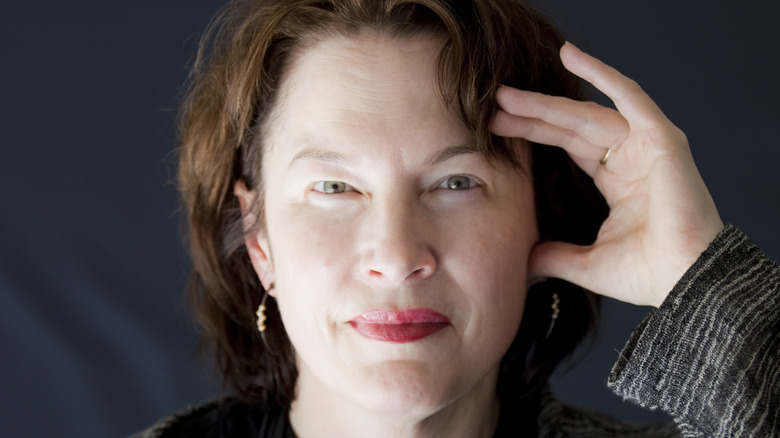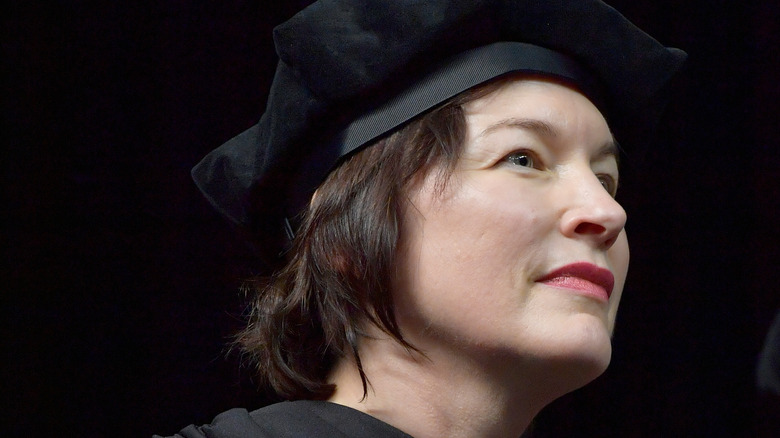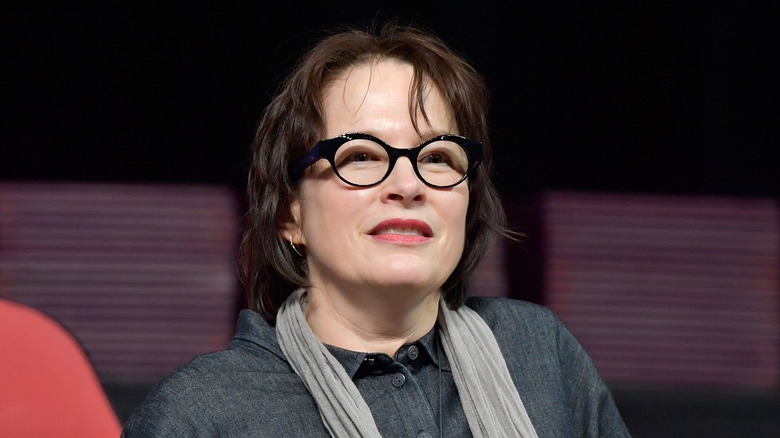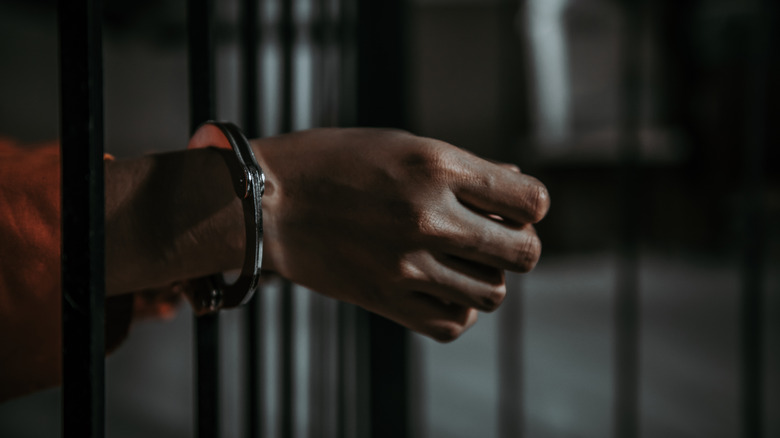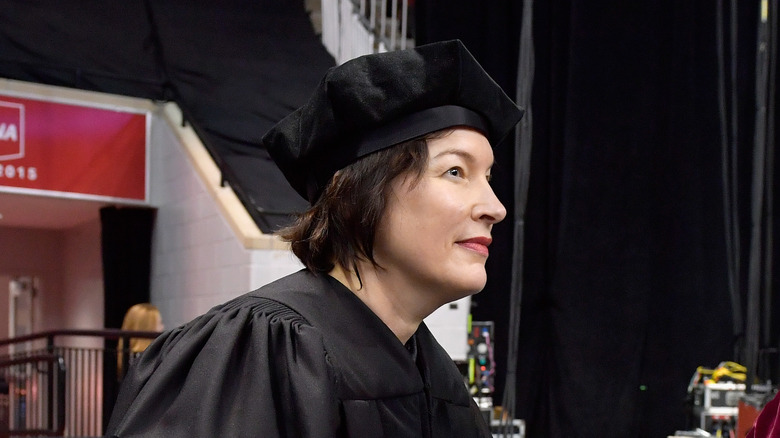The Untold Truth Of Alice Sebold
In November 2021, American author Alice Sebold publicly apologized to Anthony Broadwater, an innocent man that spent 16 years in prison for a crime he didn't commit, according to CNN. Specifically, that crime was the 1981 rape of Sebold when she was a freshman in college, per The Guardian. Broadwater's wrongful conviction and incarceration were, as Sebold said, representative of Black men being victimized by a legal system she described as "flawed."
As is often the case with people who are victims of violence, Sebold struggled with mental health issues following the assault but was able to channel her trauma into the narratives of two books. One failed to make much of a splash in the literary world, the other of which became a best-seller and inspired a popular 2009 film starring a then-20-year-old Saorise Ronan in one of her first major film roles.
'My life was over. My life had just begun'
Alice Sebold grew up in a family of academics (her father taught Spanish at the University of Pennsylvania), according to The Guardian, in a well-to-do Philadelphia suburb, though she rebelled against her parents' snobbery, as she described it. She also knew she wanted to be a writer, and to that end, enrolled at Syracuse University.
Unfortunately, within a few weeks of arriving on campus, Sebold was sexually assaulted. Specifically, she was walking in a tunnel from one part of campus to another when a man physically, verbally, and sexually assaulted her. "My life was over, My life had just begun," she said of how she felt at the time.
However, Sebold turned her energy from that assault into a singular focus to finish school and begin her writing career. All the while, she was devoted to bringing her assailant to justice.
If you or anyone you know has been a victim of sexual assault, help is available. Visit the Rape, Abuse & Incest National Network website or contact RAINN's National Helpline at 1-800-656-HOPE (4673).
Sebold's assault wasn't taken seriously and inspired a book with an ironic title
When Sebold reported the sexual assault to the Syracuse police, as The Telegraph reports, she found their response less than helpful. Specifically, an officer reminded her that the very tunnel in which she'd been sexually assaulted had at one time been the scene of a horrific murder and dismemberment of a young woman, and called Sebold "lucky."
If the police were dismissive of the trauma that a young woman had suffered in their town, Alice Sebold's family responded in an even worse way. Not long after the assault, according to The Guardian, Sebold's father simply asked her if she wanted something to eat. Her mother, meanwhile, warned her against being "defined by rape," and her sister, who was majoring in Arabic, would joke that Alice was "majoring in rape."
Sebold channeled her anger at the way she was treated in part by entitling her book about the assault "Lucky," a reference to the response the Syracuse police gave when she first reported the crime. That was Sebold's first attempt at working through the trauma of her assault.
The assault also inspired "The Lovely Bones"
Alice Sebold's book, "Lucky," did reasonably well, selling one million copies. However, her second novel, "The Lovely Bones," was a smashing success by every measure. Not only did it sell 10 million copies, Variety reported, but it also inspired a major motion picture.
Unlike "Lucky," "The Lovely Bones" is a work of fiction, though the sexual assault of a young woman is a major plot point. Specifically, the story's protagonist, 14-year-old Susie Salmon, is raped and murdered by a neighbor. From there, the book becomes a sweeping allegory about life, death, and the afterlife, as the young victim watches her family move on from her death while she deals with her own entry into Heaven.
The book inspired the 2009 film of the same name, which, though not necessarily a box-office smash, did reasonably well, according to Box Office Mojo, and helped solidify the career of Irish actress Saorise Ronan in the title role.
Sebold's testimony helped put the wrong man in prison
Five months would pass from the time Alice Sebold was first sexually assaulted until any progress was made on her criminal case. Specifically, according to The New York Times, she happened to pass by a man whom she thought she recognized as her assailant, and soon enough, Anthony J. Broadwater was a suspect.
However, the case was mishandled from the beginning, including an early incident in which Sebold identified a different man as her attacker when Broadwater was presented to her in a police lineup. Similarly, the evidence against Broadwater was "flimsy," according to The Telegraph, and it's possible that the prosecution coached Sebold in their zeal to put Broadwater behind bars.
Broadwater, for his part, served his time — 16 years — despite steadfastly maintaining his innocence. Since his release, he has lived in poverty, getting by on odd jobs, hampered by his felony conviction. Fortunately for the innocent man, a New York court fully exonerated him in 2021. Sebold, in response, issued a statement in which she appeared to partially put blame on the justice system at large.
"I am grateful that Mr. Broadwater has finally been vindicated, but the fact remains that 40 years ago, he became another young Black man brutalized by our flawed legal system,"Sebold said. "I will forever be sorry for what was done to him" (via CNN).
Broadwater's exoneration could affect Sebold's career
Broadwater's conviction has put the status of Sebold's first book, "Lucky," and any future adaptations, into a state of flux. That's because, as CNN reports, the book is an account of a crime for which an innocent man did time — although it bears noting that, in the text, Sebold doesn't identify her assailant as Anthony Broadwater, but under the fictional name of Gregory Madison, per Variety. Nevertheless, the book's publisher Scribner, and its parent company, Simon & Schuster, will stop distributing the book in all formats until further notice, "while Sebold and Scribner together consider how the work might be revised," a spokesperson said in a statement to CNN.
Meanwhile, a planned movie adaptation of "Lucky" is off the table, according to Variety. In fact, executive producer Timothy Mucciante was working on the project when he began to have doubts about Broadwater's guilt, leading to the project being scuttled and, ultimately, to Broadwater's exoneration. Further, an executive producer and writer, both once attached to the project, have left, and it appears that funding for the movie has dried up as well.
